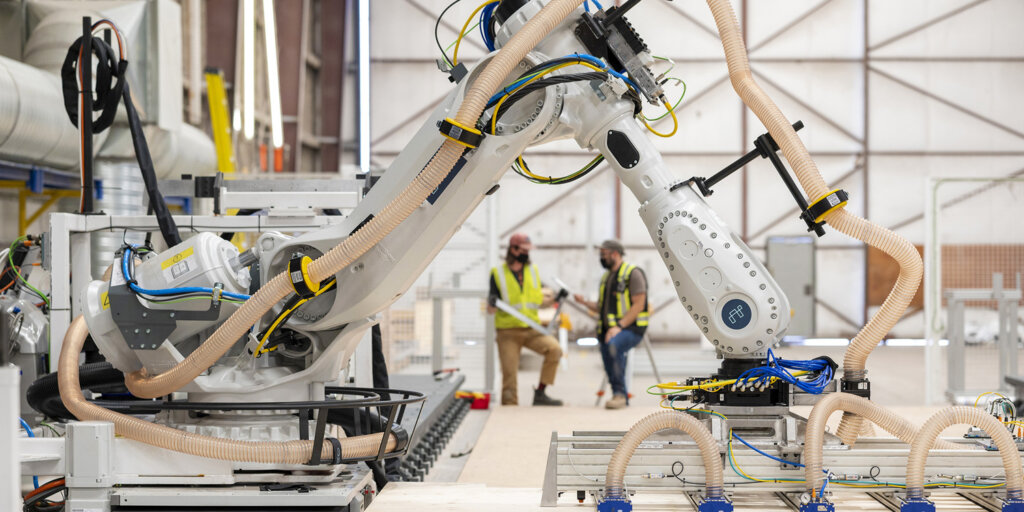Home » This Canadian Startup is Creating the GTA’s Tallest Mass-Timber Residential Structure
This Canadian Startup is Creating the GTA’s Tallest Mass-Timber Residential Structure

Oliver Lang, co-founder of Intelligent City, emphasizes the urgent need for housing and advocates for prefabricated mass timber as a scalable solution. Located at Royal York Road and Drummond Street in Etobicoke, a nine-storey housing project that utilizes this approach is set to become the tallest mass timber residential building in the Greater Toronto Area (GTA). The construction of the 58-unit project involves components made entirely from mass timber, sourced from Delta, B.C., and assembled on-site in just three months.
The construction industry faces considerable challenges, particularly the pressing need to boost production while cutting carbon emissions. The Canada Mortgage and Housing Corporation estimates that Canada will require 3.5 million new housing units by 2030. Traditional materials like concrete and steel are highly carbon-intensive, contributing approximately 89 million megatonnes of carbon dioxide annually. This sector ranks as the third most carbon-intensive industry in Canada.
Intelligent City aims to tackle these issues by incorporating mass timber, which significantly reduces carbon emissions. The design utilizes concrete only in the foundation, minimizing conventional material use. Instead of steel, glue-laminated and cross-laminated timber support the building, offering a fire-resistant design that protects the interior while remaining flexible during earthquakes.
Mass timber construction brings several sustainability advantages, like carbon sequestration. Dorothy Johns, an assistant professor of architectural science, notes that mass timber can reduce embodied carbon emissions by up to 25%. However, its widespread adoption has faced hurdles, particularly due to building code restrictions. Initially, mass timber structures were limited to one or two stories, but recent changes to the National Building Code of Canada allow for structures up to 12 stories, with plans for 18-story buildings in Ontario. The number of mass timber manufacturing facilities and housing projects is growing, driven by government initiatives aiming to invest $25 billion into prefabricated construction and increase housing output.
Lang and his partner, Cindy Wilson, founded Intelligent City in 2008 with the goal of addressing both housing shortages and climate challenges. Their previous success with architectural practice LWPAC led them to recognize the need for systematic construction methods. They transitioned to industrialized construction, spending over a decade developing a design-and-manufacturing system for mass timber, raising $35 million in funding.
The company’s approach allows for customizable housing designs based on client specifications while maintaining scalability. With technology engineered to learn from each project, Intelligent City can accelerate the design process significantly, potentially completing building plans in minutes.
Currently, the company’s factory is producing over 200 panels for the Etobicoke project, utilizing advanced robotic technology for assembly. Pre-installed features like insulation and cladding render construction 25% faster and 10% less expensive compared to traditional methods, while also minimizing waste.
Lang reflects on nearly two decades of work that have led to reliable solutions in mass timber construction. As part of the Mission from MaRS initiative, Intelligent City joins a collective effort to accelerate the adoption of innovations aimed at decarbonizing building practices and enhancing construction quality. Ultimately, the vision of a more sustainable and efficient construction industry is rapidly becoming a reality.
MaRS Discovery District
https://www.marsdd.com/
MaRS is the world's largest urban innovation hub in Toronto that supports startups in the health, cleantech, fintech, and enterprise sectors. When MaRS opened in 2005 this concept of urban innovation was an untested theory. Today, it’s reshaping cities around the world. MaRS has been at the forefront of a wave of change that extends from Melbourne to Amsterdam and runs through San Francisco, London, Medellín, Los Angeles, Paris and New York. These global cities are now striving to create what we have in Toronto: a dense innovation district that co-locates universities, startups, corporates and investors. In this increasingly competitive landscape, scale matters more than ever – the best talent is attracted to the brightest innovation hotspots.


